 |

 |
|
By Jesse Monteagudo Photos used with permission from Uncle Donald
I clearly remember what I was doing - working at the Shipping Department at the downtown Miami Sears store - when I heard about Supervisor Milk's assassination - along with San Francisco Mayor George Moscone - by the "All-American Boy" - the ex-cop, ex-Supervisor Dan White.
After a brief stint in the Navy in the mid-1950s, which included a busy exploration of the homosexual opportunities in San Diego, he moved to New York to fashion the sort of life tens of thousands of college-educated gay men of his generation did. That meant a job in business, a well-decorated apartment, a series of lovers, a willingness to accept the situation in which he found himself and which required living with what Mattachine writers of the time called 'the mask.'" During much of the sixties, Milk was a conservative Republican who worked as a stock broker and voted for Barry Goldwater. Later he became a Broadway producer, and his politics and lifestyle changed accordingly. In 1972 Milk and his then-lover, Scott Smith, moved to San Francisco. He was not the only one. Milk and Smith were riding the crest of a wave of gay immigration into San Francisco.
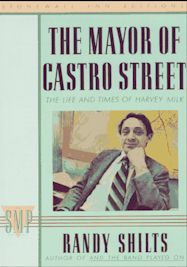 Mostly white, male and middle-class (like Milk and Smith), the new immigrants left their hometowns
in search of a place where they could be openly and safely gay. "[W]ave
after wave of gay men were descending on Castro Street," wrote Randy Shilts
in The Mayor of Castro Street: The Life and Times of Harvey Milk.
Mostly white, male and middle-class (like Milk and Smith), the new immigrants left their hometowns
in search of a place where they could be openly and safely gay. "[W]ave
after wave of gay men were descending on Castro Street," wrote Randy Shilts
in The Mayor of Castro Street: The Life and Times of Harvey Milk.
"They were not counter-culturals who had moved to San Francisco to be hippies and then found the Castro. They were people from all backgrounds who had come to Castro Street to be gay". By 1976, one fifth of San Francisco's population - 140,000 people -- was gay or lesbian. "About eighty gay men a week arrived to put down roots in the city, according to the conservative police estimate," Shilts continued. "They fueled the expanding gay business base in the Castro, but that was the most superficial gauge of their significance; they were creating a new counterculture. . . . The young men from Port Arthur, Tulsa, and Davenport were crowding in on the early hip invaders, and men of the new gay subculture followed their predecessors more in style than substance. Their common ground, of course, was their male gender and their sexuality." Building a culture around the cult of masculinity and gay sexual desire, these men replaced the conformity of the closet with the conformity of the clone. Even so, they turned San Francisco into a gay-affirmative city, to the horror of conservatives and the envy of queer people everywhere. Milk and Smith opened Castro Camera off Castro Street, San Francisco's "Main Street". As a business, Castro Camera never made much money and eventually went bankrupt. But Milk's genius was in politics, not business, and he made Castro Camera the headquarters of his political machine. His first political move was to be elected (1973) President of the Castro Village Association (CVA) of gay-owned businesses, a group he helped establish. "As president of the CVA, Milk organized boycotts and pickets in support of many of the city's largest unions, gaining the gay community valuable and lasting allies," wrote Gregory J. Rosmaita in "The Forgotten Populist, Harvey Milk". He also organized the first Castro Street Fair (1974), an annual event which is still going on strong after 25 years.
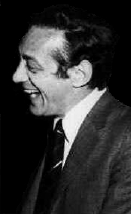 Not known for his modesty, Harvey Milk soon dubbed himself "the
Mayor of Castro Street". He wasn't exaggerating. By 1973, wrote Shilts,
"Castro Camera became less a business establishment than a vest-pocket City
Hall from which Harvey held court. The barest minimum of space was devoted
to the skimpy camera supplies. . . . Harvey could often be found on his
frumpy couch when new Castro residents came to find where to look for
apartments, what to do with a lover who had an alcohol problem, or how to
find that first job. Local merchants discovered that Harvey was the man to
go to if police took too long to answer a suspected burglary or if the sewer
overflowed . . ."
Not known for his modesty, Harvey Milk soon dubbed himself "the
Mayor of Castro Street". He wasn't exaggerating. By 1973, wrote Shilts,
"Castro Camera became less a business establishment than a vest-pocket City
Hall from which Harvey held court. The barest minimum of space was devoted
to the skimpy camera supplies. . . . Harvey could often be found on his
frumpy couch when new Castro residents came to find where to look for
apartments, what to do with a lover who had an alcohol problem, or how to
find that first job. Local merchants discovered that Harvey was the man to
go to if police took too long to answer a suspected burglary or if the sewer
overflowed . . ."
It was all Smith could do to keep the Camera store open. Other factors were breaking up their relationship. The Castro in the seventies was a giant candy store where stunning young men paraded all day and night, ready and willing temptations for both Milk and Smith. Both men took advantage of this "anything goes" sexual atmosphere. Harvey Milk did not spend too much time in the meat market, for his main passion was politics. He was an exponent of what Shilts called "politics as theater". Milk, wrote Loughery, "had a restless, theatrical side and an impatience with concepts of private life that sustained other men - the cozily domestic or the exclusively social and sexual was not for him. On the verge of middle age, he was too old to be a foot soldier in any cause but his own." Not tied down to the fallacies of the right and left, he appealed to a wide variety of constituents. "Later mythology has portrayed Harvey Milk as a radical leftist, but more careful scrutiny shows that he retained elements of his conservative background to the very end, wrote Wayne Dynes in The Encyclopedia of Homosexuality. "At bottom he held an almost Jeffersonian concept of the autonomy of small neighborhoods, prospering through small businesses and local attention to community problems."
Because Milk believed in himself, everybody else did. As Shilts put it, "He had spent the last years of his life clinging tenaciously to the naive notion that one person could change the world. Because he so dumbly believed he could change the world, Harvey Milk did." "Like politicians as different as the Kennedys and Ronald Reagan, Harvey Milk was smart enough to know that no matter how consuming the labor or details of his job might be, a leader exists to provide energy and hope to those who share his philosophy and needs to be identified with an overarching theme", wrote Loughery. "Hope for a better future, hope for gay teenagers grappling with questions of identity and bigotry, became almost a litany in Milk's speeches and functioned as a corollary to his larger message about coming out." Later Milk would talk about a mythical(?) teenager who called him direct from Altoona, Pennsylvania, asking for his help in coming out. Though it is good to have friends in power, it is more important to elect openly gay candidates. "Like every other group, we must be judged by our leaders and by those who are themselves gay, those who are visible," said Milk, in an often-delivered speech. "And we must give people the chance to judge us by our leaders and legislators. A gay person in office can set a tone, can command respect not only from the larger community, but from the young people in our own community who need both examples and hope." Milk never doubted that he was that person. He ran for San Francisco's Board of Supervisors in 1973 and 1975. Though he lost both times, he impressed newly-elected Mayor George Moscone, who appointed him (1975) to the City's Board of Permit Appeals. In 1977, district elections replaced citywide elections, assuring a Milk victory. Though gay conservatives opposed Milk's candidacy, labor unions--grateful for Milk's work in support of their Coors boycott in gay bars --backed him, as did ethnic and racial minorities. On November 8, 1977, Harvey Milk became San Francisco's first openly-gay Supervisor. Milk was not, as many people think, the first openly-gay elected official. Elaine Noble in Massachusetts and Allan Spears in Minnesota predated him. But Noble and Spears never achieved the publicity and notoriety that Milk accomplished during his scant forty-six weeks as Supervisor. Milk was a leading part of a minority-led, progressive coalition that changed San Francisco politics. He pushed through the Board of Supervisors a far-reaching lesbian and gay rights ordinance - the only nay vote was Dan White's - and opposed John Briggs's Amendment that would have banned openly-gay teachers. Milk's open homosexuality and his assertive politics angered many conservatives who expected gays to remain in their closets. He particularly grated Dan White, the ex-cop who sat uncomfortably on the Board of Supervisors.
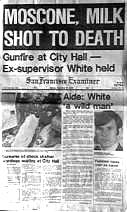 On November 27, 1978, allegedly fueled by a diet of Twinkies
(the candies, not the boys), White smuggled a gun into City Hall and shot
both Milk and Moscone dead. Fortunately for White, murderous ex-cops are
more popular than uppity gays, even in San Francisco.
On November 27, 1978, allegedly fueled by a diet of Twinkies
(the candies, not the boys), White smuggled a gun into City Hall and shot
both Milk and Moscone dead. Fortunately for White, murderous ex-cops are
more popular than uppity gays, even in San Francisco.
A jury found White guilty of second-degree manslaughter and sent him to prison for a mere seven years (May 21, 1979). Outraged gays took their anger to the streets in the "White Night" riots, but to no avail. White later committed suicide, perhaps the result of his overburdened conscience. The deaths of Milk and Moscone led to a conservative resurgence in San Francisco politics under Mayor Dianne Feinstein and her successors. Even so, queers remained a force in San Francisco politics, to the extent that a gay activist like Tom Ammiano would eventually become President of the Board of Supervisors.
At a twentieth anniversary observance of Milk and Moscone's deaths, Moscone's youngest son publicly and proudly came out as a gay man. In his lifetime, outside of San Francisco, Harvey Milk was not an important figure in a movement dominated by the likes of Jack Campbell, Steve Endean, Jim Foster, David Goodstein and Bruce Voeller. It was Milk's assassination that turned him into a symbolic figure and a martyr for the lesbian, gay, bisexual and transgender movement. Milk acknowledged as much when, just before his death, he recorded a "political will" that was "to be played only in the event of my death by assassination": "If a bullet should enter my brain, let that bullet destroy every closet door." "Murder made Harvey Milk, transformed him from local legend to international icon," wrote Friday. "Despite his considerable political skills and charismatic presence, Milk would have remained [San Francisco's] alone had he not been murdered. Alive, he fought against dog poop on San Francisco sidewalks and built bridges to local unions. Dead, he catalyzed a world-wide political movement, personified a newly-out gay politics and inspired generations of queer activists." Harvey Milk, wrote Shilts, was "a metaphor for the homosexual experience in America." "The entire story of the life and death of Harvey Milk rang so true to the experiences of gays throughout the country because it already seemed a part of the homosexual collective unconscious, even before it happened; that it happened to one man in San Francisco was a mere formality. "It had been happening for a long time. This is why a politician who had lost three out of four of his elections and served only forty-six weeks in public office ultimately became a legend. His story already existed in the lives and minds of millions of gays". Though he wasn't quite the queer Martin Luther King of our dreams, Milk's life and death continues to inspire us, two decades after it all happened. |
|||||||||
| Photos used with persmission from Uncle Don. UNCLE DONALD'S CASTRO STREET. |

© 1997-99 BEI
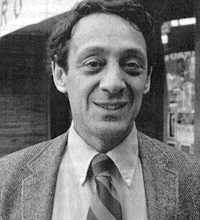
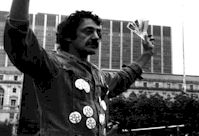 Harvey Milk: "The Quintessential Populist Maverick."
Harvey Milk: "The Quintessential Populist Maverick." 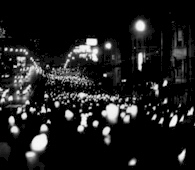 A candlelight vigil was held after the murders of Milk and Mascone
A candlelight vigil was held after the murders of Milk and Mascone